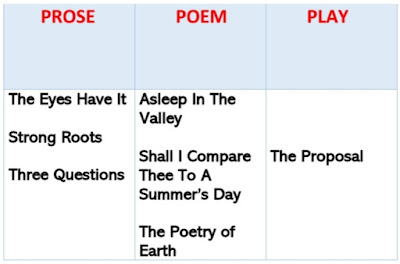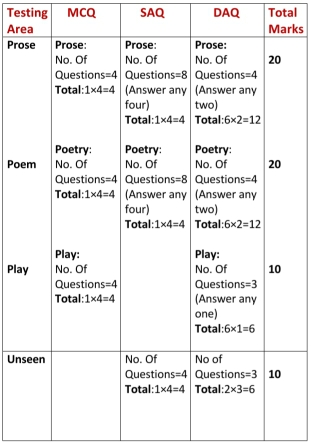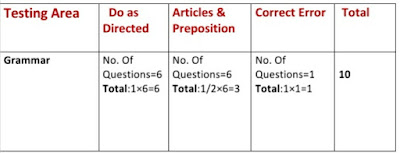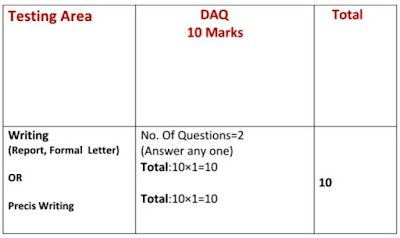In the present context of COVID-19 situation as the most of the schools are closed, the West Bengal Council of Higher Secondary Education has reduced the English Syllabus of H.S to some extent for the year 2021.
■ Reduced English Syllabus of H.S 2021:
Let us see the reduced English Subject Syllabus of H.S for the year 2021.
The following is the reduced English Syllabus of H.S 2021:
The West Bengal Council of Higher Secondary Education conducts H.S Examination every year. The students are to appear for 80 marks written examination.
The questions-patterns are divided into two parts — Part A and Part B. Part A normally includes descriptive type question-answers from prose poem and play sections, unseen, Grammar and Writing. Part B includes the multiple choice question-answers and short questions-answers from prose, poem and play sections.
■Distribution of Marks and Question Patterns of H.S English:
Let us see the distributions of marks and question patterns of H.S English Subject.
The followings are the distribution of marks and question patterns:
Next, the Grammar Section which carries 10 marks. Let’s see the distribution of marks in grammar section.
Next, the Writing Section which carries 10 marks. Let’s see the distribution of marks in writing section.
■ H.S English Suggestion 2021:
The following descriptive questions may come from the prose, poem and play sections for English Subject in H.S English Examination 2021.
■ Prose:
● Strong Roots:
1) “I would say mine was a very secure childhood……” — Whose childhood is referred to here? Where was his childhood spent? Why did Kalam feel that he had a secure childhood?
2) “Our locality was predominantly Muslim.” — Who’s is the speaker? How does the speaker describe the locality? What picture of communal harmony do you find in his description?
3) What was the relevance of prayer as explained by Kalam’s father to Kalam in his childhood?
4) “Adversity always presents opportunities for introspection.” — Who said this and to whom? How does the speaker explain the line?
5) What had remained the routine for Kalam’s father even when he was in his late sixties? What did Kalam say about his emulation of his father?
6) What is Kalam’s perception about divine power? How according to him, can a person achieve freedom, happiness and peace of mind?
7) “This is not a correct approach at all” — Who said this? What is the approach spoken about? Why does the speaker take the approach? Why is the approach not correct?
● The Eyes Have It:
1) “I wondered if I would be able to prevent her from discovering that I was blind.” — Who thought so? Why did the speaker hide to disclose his identity? What attempts did the speaker make to prevent the girl discovering that he was blind?
2) “Yes this is the best time.” — Who is the speaker? What is the place spoken about in the line? What time of the year is the best? Why does the speaker think that it is the best time to visit?
3) “Then I made a mistake.” — What mistake did the speaker make? Why was it a ‘mistake’? What removed the speaker’s doubt? What did the speaker do then?
4) “Her voice had the sparkle of a mountain stream.” — Who thinks so? Whose voice is referred to here? Why did the voice become so special?
5) “She would forget our brief encounter.” — Who said this and about whom? What is the ‘brief encounter’ referred to here? Why did the speaker think so?
6) “The man who had the entered the compartment broke into my reverie.” — Whose ‘reverie’ is mentioned here? Who is the man? What was the reverie about? How did it come to an end?
7) “She had beautiful eyes, but they were of no use to her.” — Whose eyes are mentioned here? Why were the eyes useless to her? Bring out the ironical twist in the situation.
● Three Questions:
1) What were the three questions that occurred to the Tsar? Why did he need correct answer to the three questions? How did the learned men answer to the Tsar’s questions?
2) How did the Tsar nurse the wounded the man?
3) “Forgive me ! said the bearded man in a weak voice..” — Why did the bearded man become an enemy of the Tsar? What did the man swear and resolve to do? Why did he ask for forgiveness of the Tsar and did he promise the Tsar? What did the Tsar do when he had gained the man for a friend?
4) “I resolved to kill you” — Who was the speaker? Why did the man want to kill the Tsar? How was the man wounded? Why did he resolve instead?
5) “You have already been answered.” — Who said this and to whom? How has the person referred to been answered?
■ Poem:
● Asleep in the Valley:
1) Justify the title of the poem “Asleep in the Valley”.
2) Describe the poem “Asleep in the Valley ” as an anti-war poem.
Or, Discuss the theme of the poem “Asleep in the Valley”.
3) “They fill the hollow full of light.” — What is the hollow referred to here? How does the hollow look? Who is lying in the hollow? How is he lying there?
4) “In his side there are two red holes.” — Who is the person referred to here? What do the two red holes signify? What attitude of the poet to war is expressed in the line. (Bring out the futility and pity of war as expressed in the line.)
5) “Ah, Nature keep him warm; he may catch cold.” — Who is he? Why he may catch cold? Why does the poet ask the Nature to keep him warm?
● Shall I Compare Thee to a Summer’s Day:
1) “But thy eternal summer shall not fade.” — Who is the poet? What is meant by ‘thy eternal summer’? Why shall not ‘thy eternal summer’ fade?
2) How does the poet Shakespeare immortalise his friend’s beauty?
Or, “When in eternal lines to time thou grow’st” — What are the ‘eternal lines’? What will grow in eternal lines? Whom does the poet address here as ‘thou’? How will ‘thou grow’st’ in eternal lines?
3) How does Shakespeare compare the beauty of his friend to that of a Summer’s day in the sonnet no 18? Why does Shakespeare think that the comparison between his friend’s beauty and that of a Summer’s day is not appropriate?
● The Poetry of Earth:
1) Why does Keats feel that ‘The Poetry of Earth’ never cease?
2) What pictures of the two seasons does Keats draw in the poem “The Poetry of Earth”?
3) “….he has never done with his delights.” — Who is ‘he’s referred to here? How does he delight? What does he do ?
4) “…. he takes the lead in summer luxury.” — Who ‘he’? When does he take the lead? How does he take the lead?
5) “On a lone winter evening ” — How does the poet describe the loneliness and silence of the winter evening? How is the music continued in the depths of winter?
■Play:
1) Comment on the appropriateness of the title of the play “The Proposal”.
2) Describe a brief sketch of the character of Chubukov as a sensible father.
3) Give a brief sketch of the character of Lomov.
4) Sketch the character of Natalya.
5) Comment on the theme of marriage as presented in the play The Proposal.
6) Describe the quarrel over the hunting dogs.
7) Make a brief sketch of social life as presented in the play The Proposal.
8) ” She is like a love sick cat.” — Who is the speaker? Who is referred to as ‘she’? Do you really think that she is love sick?
■ Writing
● Report:
2) Write a newspaper report on the 200th birth anniversary of Vidyasagar celebrated in your school.
5) Write a newspaper report on the seminar about the Importance of Water Conservation
6) Write a newspaper report on Annual Prize Distribution Ceremony and Magazine Publications Programme in your school.
● Letter:
10) Letter to the Headmaster to introduce online classes.
11) Letter to the Headmaster to construct a Cycle Shed.
12) Letter to the Manager of a company to complain the poor quality of product.
13) Letter to the company regretting for late delivery of products as ordered by the company.
14) Write a letter to a publisher placing an order for books for your club library.
You may also like to read:




